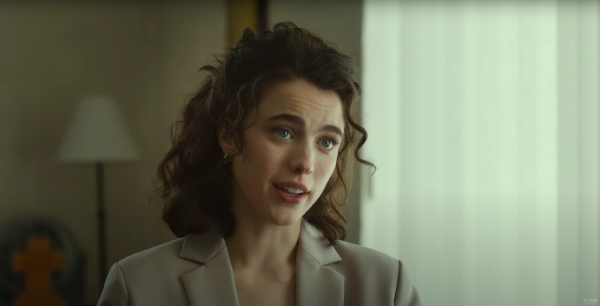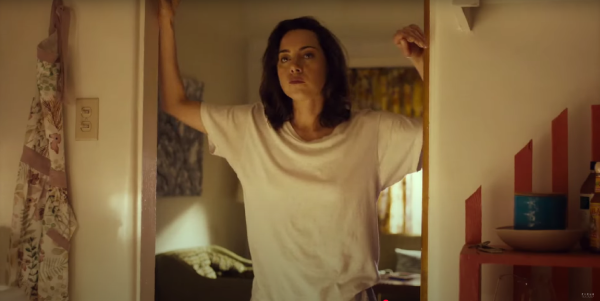"Sorry, Baby" is a Masterful Look at the Emotions of Life
From the cinematography to the script to the acting, Sorry, Baby is undoubtedly one of the best films of the year.


After the release of last year’s Drive-Away Dolls, lesbian audiences set their sights on the next Tricia Cooke and Ethan Coen collaboration, Honey, Don’t! The film follows the eponymous Honey, a lesbian private detective, as she goes about her life in a small town in California. Margaret Qualley’s Honey is bold, confident, and sexual, making for a compelling and entirely different (I would go so far as to say better) character to the one she played in Drive-Away Dolls.
Qualley’s performance, however, is hamstrung by a messy plot that lacks coherence even in its final moments. It’s difficult to even provide a straightforward synopsis without spoilers because of how frequently the central mystery not just twists but changes entirely. Rather than attempt to directly review the movie (something Incluvie writer Nilufer Ozmekik has already done better), I wanted to take the time to break down the lesbianism in the film, because that’s what I do best.
One plot point that stayed consistent throughout the film was the relationship between Honey and MG, a police officer played by Aubrey Plaza. From the first time they are on screen together, it’s clear there’s a mutual attraction and we get to see that play out. Honey and MG both don’t want much from a woman. Our first time seeing Honey, she is leaving a woman in her bed and informing her that the door will lock on her way out. Neither crave a relationship, and in many ways that’s what allows them to fit together.

Their sex scenes are frequent and hot; you can tell there are queer women involved in the film, and that’s important. Regardless of your preference in sex toy or position, you will likely find yourself represented at some point. Plaza and Qualley are both comfortable kissing women—a fact that’s certainly not a given in queer media, especially when one of the actresses involved is straight—and their chemistry truly does shine. It’s sexy, regardless of what else is going on.
One of the most resonant scenes of the film takes place just after Honey and MG have sex and right before they’re about to start again. The two women share a cigarette and discuss their relationship with their fathers. Both MG and Honey were beaten growing up and know that their fathers would not accept them for who they are now. It’s a sweet moment that feels realistic—it’s something a queer person would ask another queer person about, and it doesn’t have to be a big deal in the moment despite how important it is to them as people.
MG and Honey fall into the classic butch/femme relationship model. Although this has been a popular form of relationship since at least World War II, when the war created opportunities for women to fill traditionally male work roles and thus gave them a degree of financial independence, it hasn’t been highly represented in recent media. It’s fun to see a femme woman, Honey, so confident in her sexuality and unafraid to share it with the world. It’s equally exciting to watch MG embrace her butchness.
The fact that Honey is femme has made her into a person that easily and frequently rejects advances from men, ignoring their come-ons until she is unable to do so. She’s been made tougher because of her appearance and what men think that invites.

By the same token, MG’s toughness is more evident by her aesthetic but that doesn’t mean she doesn’t feel things. She’s emotional and opens up about her past, showing vulnerability when she’s alone with her femme. My delight at seeing Aubrey Plaza play a butch lesbian is somewhat tampered by the fact that she’s playing a cop. Oddly, however, the film seems to acknowledge this feeling, with both Honey and MG implicitly agreeing that police officers and military men are more likely to abuse their families.
I deeply enjoyed the way their relationship developed throughout the film. It felt good to watch a movie where lesbianism was important to who the main characters were, but wasn’t necessarily a huge plot point. Each of these women felt developed both individually and in the way they exist in relation to the other.
An odd scene happens early on in the movie when Honey enters a bar where her (now dead) client used to work. A woman is there playing the piano and notes that she hasn’t seen Honey around lately. She asks if Honey still drinks, and she says of course.
The piano woman is glad to hear that. It’s a slippery slope, she says. First you’re sober, then you’re working out, next thing you know you’re dating a man and voting Republican. This struck me as not only incorrect, but irresponsible.
It is true that queer people are far more likely to use drugs and alcohol than their straight counterparts. A 2015 study by the Substance Abuse and Mental Health Services Administration (SAMHSA) found that 39.1% of sexual minorities use illicit substances compared to just 17.1% of straight people. When it comes to alcohol, the rate of heavy usage for female sexual minorities is nearly double that of sexual majorities, a statistically significant difference.
This alcohol consumption is not to the benefit of the community. It can lead to severe problems and lifelong struggles with alcoholism. 30% of queer people struggle with addiction. That doesn’t mean it’s a fate we must succumb to, though. Many queer people are sober and are living better lives because of it.
The Lesbian Bar Project’s documentaries featured multiple bar owners who are now sober. These women have chosen better lives for themselves and still exist not just as lesbians, but as pillars of the community. There are groups popping up all over the country that cater to sober or sober-curious LGBTQ+ people. Not only is it possible to be sober and a lesbian, it’s possible to be a sober lesbian with a thriving social life.
I don’t mean to be a killjoy—I understand that Honey Don’t! was attempting a joke about the rampant alcohol use in our community. And it is funny, if the person watching is comfortable with their relationship to alcohol. But if you were considering quitting and the joke made you think twice, consider this your sign to try being sober—all the cool kids are doing it.
As Letterboxd user Jay says, “as a lesbian 5 stars, as an everyday letterboxd user 2.5”. While the movie will leave you with more questions than answers, it’s fun for the lesbian sex and the number of times Margaret Qualley says “I like women.” It’s one of those times where the plot can just wash over you and mean nothing. Where Drive-Away Dolls had a fairly cohesive plot with psychedelic interludes that I wished I could skip, this whole film is one psychedelic experience that, on an emotional level, is worth watching every minute of for the lesbians.
Related lists created by the same author
From the cinematography to the script to the acting, Sorry, Baby is undoubtedly one of the best films of the year.
Related diversity category
Lin-Manuel Miranda’s 'Vivo' is a children's animated musical rich in Hispanic culture! The story follows a kinkajou as he delivers a love song for a friend.
Related movie/TV/List/Topic
The film's storylines read as allegories for the queer experience and that's a source of solace for LGBTQIA+ fans!